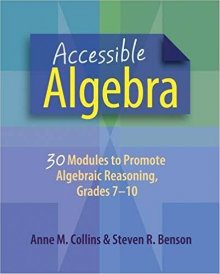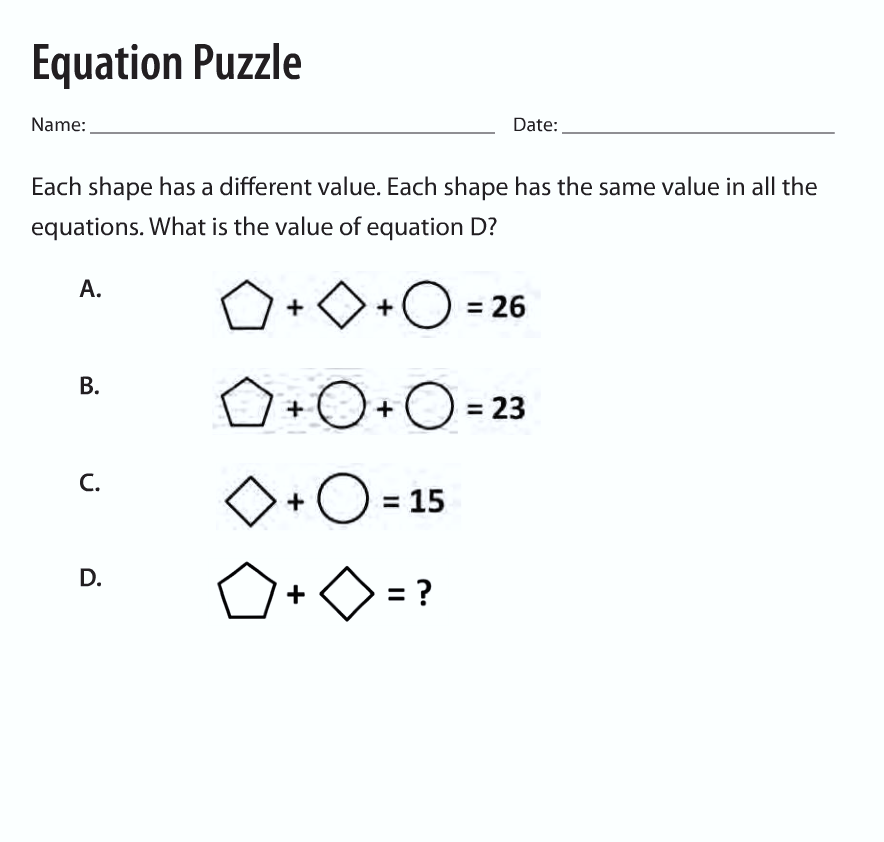30 Modules to Promote Algebraic Reasoning
Accessible Algebra: 30 Modules to Promote Algebraic Reasoning, Grades 7-10
By Anne M. Collins & Steven R. Benson
(Stenhouse Publishers, 2017 – Learn more)

Accessible Algebra: 30 Modules to Promote Algebraic Reasoning, Grades 7-10 is a book all algebra teachers should have in the classroom. Anne Collins and Steven Benson provide teachers a better understanding of where students might struggle, offer ideas on how to meet individual student needs, and present a different way to teach a particular concept.

Each of the 30 modules can be implemented in any algebra classroom. In each module you can find the Common Core Standard, potential challenges and misconceptions, a description of how the authors taught the material in the classroom, and a section on meeting individual needs.
The “In The Classroom” sections were my personal favorite because they describe how each module might be taught in a real classroom and how teachers might talk about each task with their students.
For example, in Section 3 (Functions) Module 26, students are given a task to fill the table of Celsius to Fahrenheit and below there is the class discussion among students (all the student quotes in the book are real). The included images show exactly how each student found the answer differently.
Expressions, equations, and functions
Throughout Accessible Algebra I could easily identify where I could add specific content to my teaching, because the book is focused only on expressions, equations, and functions. Collins and Benson give the reader a chance to see how students make mistakes and how to teach concepts effectively. Having the actual tasks that the authors used in their classrooms in the appendix gives every teacher a repertoire of different activities and tasks to do with their students.
When I was a first year algebra teacher, I hated teaching Linear Systems. Students always seemed to struggle with the idea of substitution, and they looked on like I was a magician when I made letters equal numbers.
But Accessible Algebra starts the linear systems lesson with a puzzle for students to solve. The lesson’s “In the Classroom” feature notes: “This teacher believes that this equation puzzle will help him understand how his students think about a system of equations prior to a formal lesson. He invites student volunteers to share their thinking and solutions.”
In the lesson the teacher builds procedural fluency from conceptual understanding and uses evidence of student thinking to help the whole class learn and understand linear systems. Using this strategy when I first started teaching would have hooked the students and made the concept easier to grasp for all of them.
An essential book for all algebra classes
This is an amazing book that I wish had been available when I was first teaching algebra. The NCTM effective teaching and learning process standards call for tasks that promote reasoning and problem solving. These expectations make this book essential for all algebra classrooms. I would choose it to use in the beginning of the year as a book study for our Math Department to improve our lesson planning.
Accessible Algebra provides all students the chance to learn algebra at a high level. Reading the book has made me a better math teacher and given me ideas to implement right away in my classroom.
Trever Reeh has been a math teacher at Schuyler Community Schools (NE) for the past five years. He uses and incorporates different tools in his math classroom and blogs at Math Techniques & Strategies about his journey at the school. He is also a mentor teacher at the Joslyn Art Museum, incorporating math into different works of art.




































Do I understand that Accessible Algebra: 30 Modules … gives authorization to copy some pages for student use? Your review makes it seem so, but the copyright info. on the Amazon website (where I was looking at purchasing) says no part of the book can be reproduced.
Amy – We suggest visiting the publisher’s page: https://www.stenhouse.com/content/accessible-algebra# Amazon may be referring to preview material. Contact Stenhouse if you want to be sure but we’re confident that any materials intended for use with students can be reproduced by purchasers of the book. There is also a support site for the book maintained by the authors: http://blogs.lesley.edu/mindfulmathematics/accessible-algebra/